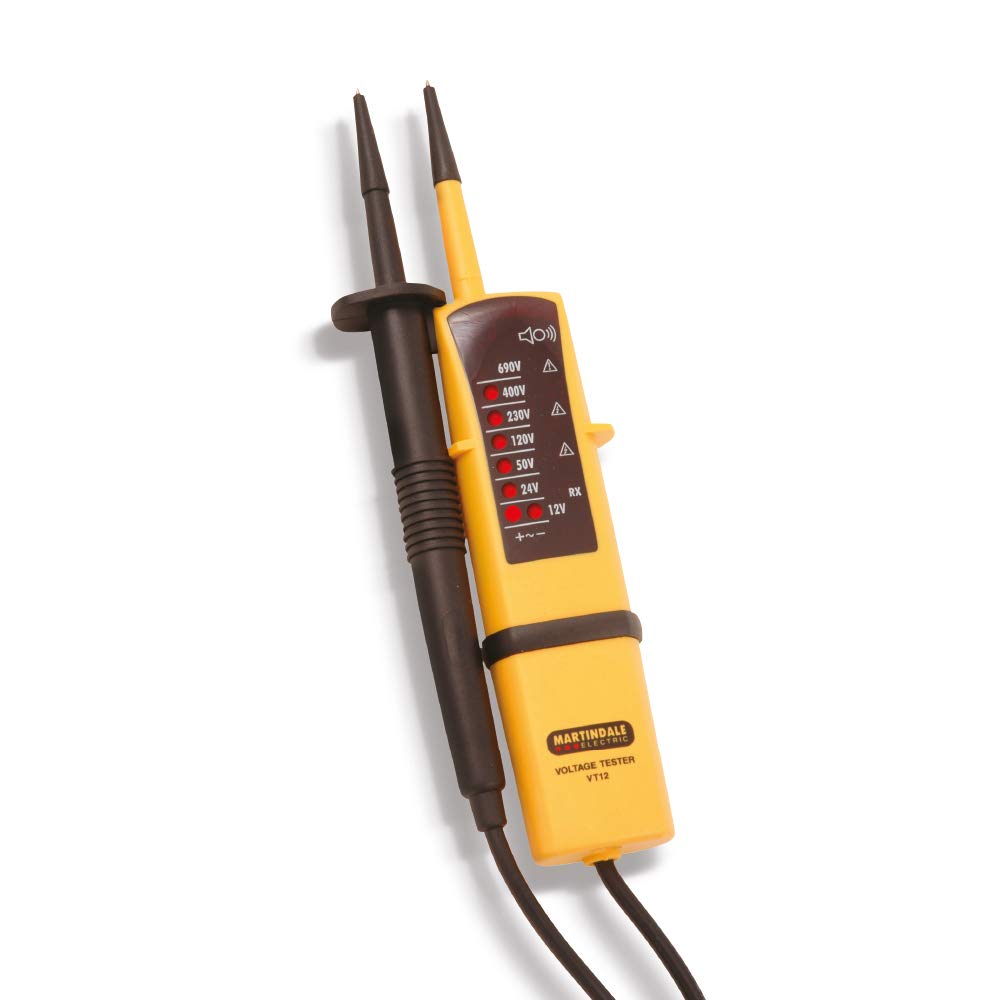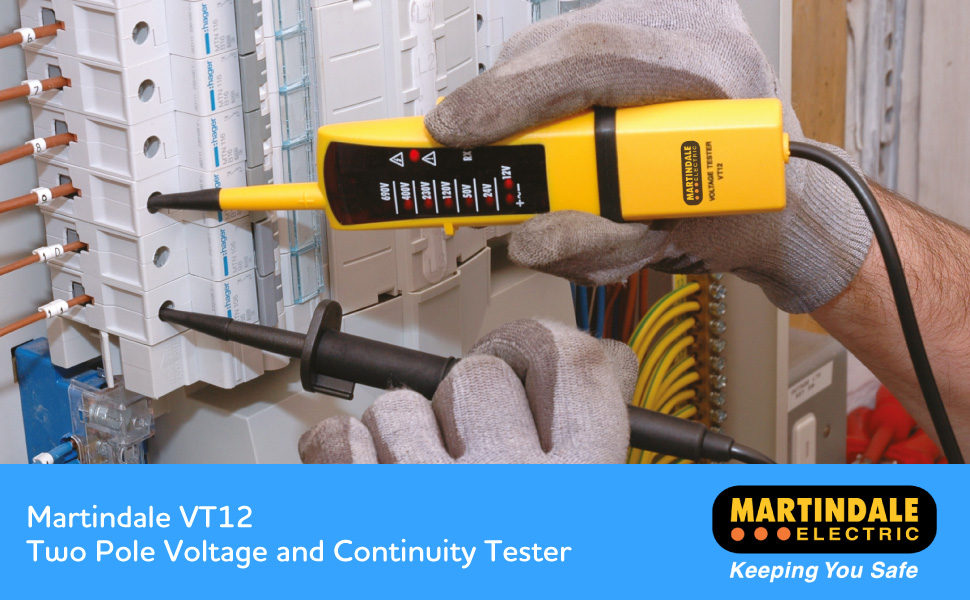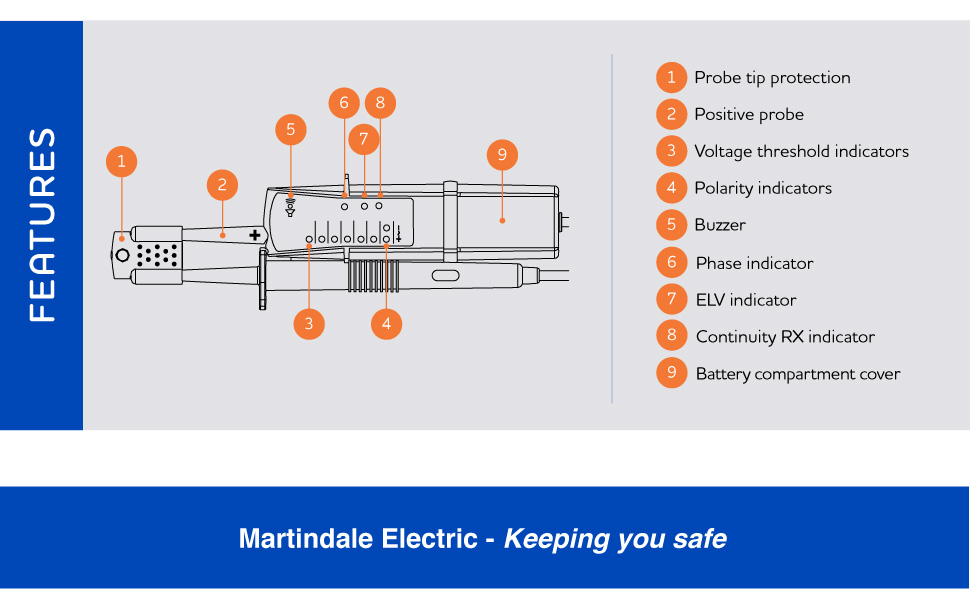Martindale VT12 Two Pole Voltage and Continuity Tester

Martindale VT12 Two Pole Voltage and Continuity Tester, Yellow




| Weight: | 130 g |
| Dimensions: | 20.5 x 6.7 x 2.7 cm; 130 Grams |
| Model: | VT12 |
| Part: | VT12 |
| Colour: | Yellow |
| Pack Quantity: | 1 |
| Batteries Required: | Yes |
| Batteries Included: | No |
| Manufacture: | Martindale Electric Co Ltd |
| Dimensions: | 20.5 x 6.7 x 2.7 cm; 130 Grams |
| Quantity: | 1 |
This is a very good tester for the money. I have been an electrician for almost 50 years, it does exactly what i wanted for a lot less money than other testers. Would highly recommend.
We like this tester. “Set of lights” voltage testers all have much the same functionality. This one is physically smaller than any other we have used, making it more portable and convenient. It is advertised as 15cm long, which is incorrect: my tape measure says it is 20cm long.
A compact and lightweight design, the two sections clip together well. Bright LED voltage level indicators from 12V for DC and AC voltages. Audible beep and light when testing continuity. The removable shrouds on the end of the probes are initially difficult to remove.
Essential basic safety and diagnostic tool
Martindale products are a reliable choice
if you are an amateur, sorting out sockets and ceiling roses and switches in your house.. or even checking continuity in a broken electronic device to rule out if its a connection issue.
many of us, myself included.. are NOT electricians who are looking to buy one of these. if you are then chances are you have one or two sets of the very expensive ones. they would be more durable and trade rated or whatever. even though this is more than capable for trade use.
for the average diy person the price is considerably more expensive than one of those little screwdrivers that light up, but that is probably what you have been using before looking at one of these right?
bin them.
they are fine for messing about with 12v circuits or whatever. but not 240v!!
this martindale device ensures that its made out of the right materials so that you cant get zapped through the plastic housing.
it beeps and shows the right led when touching the probes together. you know its working then and the batteries are good.
you can buy an additional proving device to ensure its reading the correct voltage before attempting to mess with any connections, get it if you are in doubt and value your life!
but for an average diy person. who has the power shut off and nobody will accidentally turn it back on, this device is perfect.
i tested it on a live socket. it gives this angry beep sound. a bit different to the standard beep for continuity testing. and showed the right voltage (240v). all you do is connect the yellow device end to live and itl read the voltage to tell you its live.
its a real time and life saver.
just stick it in your back of electrical stuff, and whenever you are going to change some switches or sockets or whatever.. use this device on it.
turn off the power. use this device again.
and if you want.. use it again! just to be sure!
its a protective shield between you and a nasty shock or instant death!
a great thing to pair with this is a socket tester. its a little plug that will show you if the live and neutral are correct. if the socket works and is live and also has an rcd function to trip the circuit. they arent expensive but go well with this. i plug it in, if it lights up… socket is live. so i test with the probes then to see if the probes really are working.
i also check then when all installed.
sockets are easy peasy for an electrician. they install so many. for a diy person u probably only change a socket once or twice and mostly for cosmetic reasons!
but get this to be safe. and also to enjoy working on things at home.
if you have no idea what im talking about with continuity or 240v and 12v etc.. then best to not buy this and to call an electrician haha
that being said. still buy one of those socket tester plugs. check all of ur sockets at home and check that the trip switch activates. thats a good one to get for anyone
Detector worked fine but had to remove shrouds to put into a socket. Took a few minutes to realise shrouds were removable as I was thinking it was going back. Still, always wanted a Martindale detector at home and pleased I have one. They are the benchmark in tools like this.
Ignore the review that complains about the small tips, there is capping that you can remove that makes the tips longer for reaching more awkward spots
Would have liked it to have been in a case but apart from that it should last me a long time like my old RS tester did. The leds are nice and bright, the continuity audio is clear, so I’m more than happy with this voltage tester.
– No nonsense method for testing for dead without having to switch the multimeter to the right setting.
– A multimeter requires three hands if you have nowhere to place it.
– Looking at the multimeter display while holding the probes on live/neutral etc., was awkward/risky.
– The multimeter would not show voltage if neutral was open. < THIS WILL KILL YOU. - The multimeter would show low voltage/no volts if both wires were live. < THIS WILL KILL YOU. With that in mind I used the multimeter and then used a neon screwdriver to do a final test on every individual wire for live. Despite what you may read, neon screwdrivers are perfectly safe if you understand their limitations and test on a known live before and after use (which you should do with anything including this VT12). I simply decided to swap those two tools into this one device that tests both single (the neon screwdriver test) and double (the multimeter test) poles. Buy the VT12 and you can throw your neon screwdriver away as it does the all important single pole test and never use only a multimeter to test for dead. I also picked up the Martindale NC4 Dual Sensitivity Non-contact Voltage Tester to go with this VT12 for quickly checking live wires (again don't use these to test for dead, they aren't reliable enough). Unlike the person giving this a weird 2 star review, I know how to remove the probe caps to expose the longer probes. There's always one in reviews that fails to understand how what they are reviewing actually works!